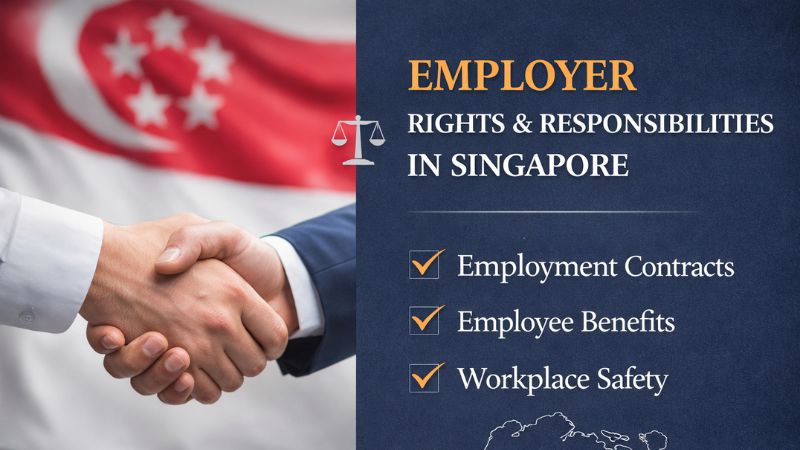Singapore is known as one of the best places to work due to a steady supply of high-quality jobs, favourable employment terms, and strong protection for employees. At the same time, these conditions set high standards for employers managing their workforce. Below, we discuss employer rights in Singapore, explore employee rights and responsibilities in common workplace scenarios, and outline practical strategies to ensure compliance with employment legislation.
Key Takeaways
- The Employment Act of Singapore is a central piece of legislation which defines employee rights and obligations and sets out responsibilities for employers.
- Workplace policies and contracts of service cannot be less favourable than the terms of the Employment Act.
- Companies operating in Singapore also need to adhere to the Tripartite Guidelines on Fair Employment Practices set by the unions, the government, and the national federation of employers.
- Non-compliance with employment legislation can lead to restrictions and heavy penalties.
- Businesses are advised to engage employment lawyers to develop effective workplace policies and contracts of service, and provide for compliance with employment legislation.
Why Understanding Employer Rights and Obligations Is Critical
In Singapore, employers, the government, and the unions, collectively referred to as tripartite partners, prioritise workplace fairness as well as inclusive and progressive employment practices. Considered a key competitive advantage for Singapore, tripartism promotes harmonious employment relations.
Meanwhile, failure to comply with employment laws and regulations can result in restrictions, severe fines, and even imprisonment. Accordingly, companies need to have a clear understanding of employer rights in Singapore when setting up employment terms or regulating workplace relationships, from hiring and promotion to dismissal, termination, or retrenchment.
Brief Overview of the Employment Act in Singapore
An Employment Act (EA) is a central pillar of Singapore’s labour law, setting up the legal framework for all types of workplace relationships, including full-time and part-time employment, as well as temporary employees. Applying to both local and foreign employees working in Singapore, it covers most categories, except for self-employed persons, seafarers, domestic workers, and statutory board employees.
The EA sets the framework for the main aspects of employment relationships, including:
- contracts of service,
- payment of salaries,
- employer’s obligations related to employment records,
- entitlements such as vacations and sick days,
- maternity protection and childcare leave,
- dismissals, termination and retrenchment.
Employer Rights in Hiring and Probation
At hiring, employers have the right to set up the terms for contracts of service according to the actual job requirements and company policies. However, according to the EA, every term of such contracts that is less favourable to an employee than the terms defined in the legislation is considered as void to the extent that it is inconsistent with the law.
In addition to observing the Employment Act, employers are expected to adhere to the Tripartite Guidelines on Fair Employment Practices as well as the Fair Consideration Framework (FCF). Among other requirements, these frameworks encourage a merit-based approach and prohibit discriminatory hiring.
For example, the FCF guidelines:
- expect all employers in Singapore to advertise their job vacancies on MyCareersFuture, even if exceptions apply,
- prohibit discrimination based on age, gender, nationality, or race,
- require providing job seekers with at least 14 days to respond to job posts.
After hiring, employers can set up a probation period to vet and review the performance of a new employee. While the existing regulations do not include any requirements for the length of probation, in many cases employers set its length between 3 and 6 months. Importantly, employees can be eligible for entitlements such as paid leave and sick leave after three months of service, irrespective of the length of the probation period.
Workplace Policies and Obligations
In addition to outlining the conditions of employment in the contract of service, organisations can bring more clarity into their employment relationships by defining their key terms in their workplace policies. Employers can further ensure that their workplace policies are binding on their employees by aligning them with the Employment Act and other regulations in Singapore, and including such policies as a part of employment contracts.
By creating clear workplace policies, employers can promote professional conduct in the workplace, outline operational procedures, and clarify entitlements and duties. A comprehensive workplace policy can help manage risks, enable employee safety, provide for data security, and ensure a harmonious working environment.
Employee Misconduct and Disciplinary Action
Dismissing an employee in cases of misconduct is one of the situations where compliance with the Employment Act is critical. Even when an employee’s wrongdoing seems obvious, an employer is obliged to follow a formal procedure known as a due inquiry to comply with legislation and avoid risks of the employee filing a claim for wrongful dismissal in Singapore.
Thus, all cases of employee misconduct in Singapore, including theft, dishonest behaviour, disorderly conduct, or insubordination, should be thoroughly investigated. The employer is further obliged to notify the employee of the alleged misconduct, provide them with an opportunity to present their version of the events, and appoint a responsible person to conduct the inquiry.
Termination of Employment
The termination of employment in Singapore is another area requiring particular concern. While both employers and employees have the right to terminate the contract of service, the parties bear certain legal obligations that they need to comply with at termination.
Generally, employers can terminate the contract of service by providing advance written notice to an employee. Section 10 of the Employment Act of Singapore defines the period of notice depending on the length of employment, for example:
- 1-day notice for someone employed for less than half a year,
- 1-week notice for those employed for up to 2 years,
- 2-week notice for those employed between 2 to 5 years,
- 4 weeks for employees who have been with the company for more than 5 years.
If the company wants to terminate an employee’s contract without notice or without waiting for the expiry of the notice period, it can do so by paying the employee the part of their salary prorated for the period of notice. Other cases of termination of employment in Singapore without notice include mutual agreement between the parties or a breach of contract.
Retrenchment and Redundancy
When a company considers reducing its workforce to adjust operations or eliminate redundant positions, known as retrenchment, it needs to observe the terms of employment contracts and the Employment Act. Other legal norms may apply as well, for example, the Child Development Co-Savings Act for affected working mothers whose maternity leave coincides with retrenchment.
While the Employment Act does not require the company to pay retrenchment benefits to those employed for less than 2 years, the company may provide such benefits out of goodwill. Notably, the EA doesn’t determine the amount of retrenchment benefits for any category of employees, so the company can define the amount of retrenchment benefits in its workplace policies and employment contracts. In general, the prevailing norm for retrenchment in Singapore is payment of 2 weeks to 1 month’s salary per year of service.
Protecting Employer’s Interests
The employment law in Singapore is multifaceted and requires employers to ensure workplace standards are in compliance with the Employment Act of Singapore and other applicable legislation, including observance of Tripartite Guidelines. Meanwhile, developing workplace policies and contracts of service and ensuring compliance with employment practices often requires professional legal advice.
Engaging experienced employment lawyers to implement the requirements of the legislation at the workplace helps employers to:
- ensure compliance with the Employment Act,
- observe Tripartite Guidelines,
- avoid restrictions and penalties for non-compliance,
- provide comprehensive guidance to employees through workplace policies,
- ensure productive and efficient employment relationships.
Conclusion
Businesses operating in Singapore need to navigate a complex regulatory landscape for employment practices. While the Employment Act serves as a central pillar of Singapore’s workplace legislation, the application of the entire corpus of employment law and observance of Tripartite Guidelines often requires specialised legal advice. For additional information on employer rights in Singapore and ensuring regulatory compliance, please don’t hesitate to contact IRB Law employment lawyers for a free initial consultation.
FAQs
What is the standard probation period under Singapore law?
In Singapore, the employment legislation does not limit the length of the probation period. In practice, many employers set the probation period between 3 and 6 months.
How to handle employee misconduct?
In case of employee misconduct, employers have the right to dismiss an employee after conducting a due inquiry. Other options include downgrading an employee or suspending them from work without payment of salary for no more than one week.
How do companies approach retrenchment in Singapore?
When employers consider retrenching their employees due to restructuring or other adjustments of their operations, they need to provide employees with an advance notice, observing the periods as defined in Section 10 of the Employment Act. While the law doesn’t define the amount of retrenchment benefits, many employers pay between 2 weeks and 1 month’s salary per year of service.





